英语教学论作业
西南大学《小学英语教学论》网上作业及参考答案
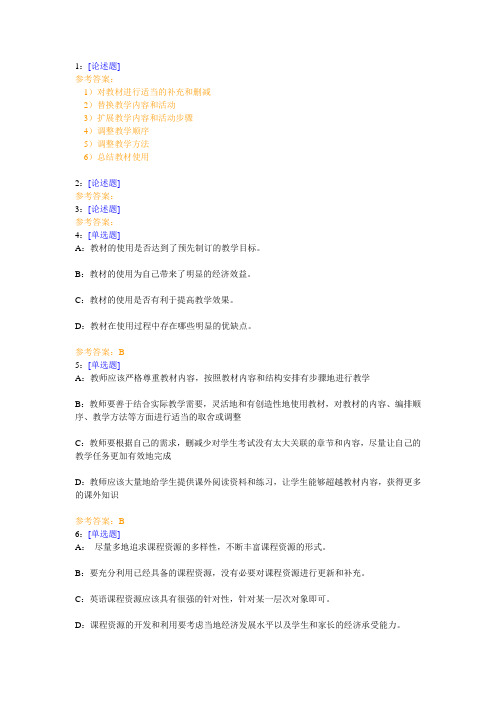
1:[论述题]参考答案:1)对教材进行适当的补充和删减2)替换教学内容和活动3)扩展教学内容和活动步骤4)调整教学顺序5)调整教学方法6)总结教材使用2:[论述题]参考答案:3:[论述题]参考答案:4:[单选题]A:教材的使用是否达到了预先制订的教学目标。
B:教材的使用为自己带来了明显的经济效益。
C:教材的使用是否有利于提高教学效果。
D:教材在使用过程中存在哪些明显的优缺点。
参考答案:B5:[单选题]A:教师应该严格尊重教材内容,按照教材内容和结构安排有步骤地进行教学B:教师要善于结合实际教学需要,灵活地和有创造性地使用教材,对教材的内容、编排顺序、教学方法等方面进行适当的取舍或调整C:教师要根据自己的需求,删减少对学生考试没有太大关联的章节和内容,尽量让自己的教学任务更加有效地完成D:教师应该大量地给学生提供课外阅读资料和练习,让学生能够超越教材内容,获得更多的课外知识参考答案:B6:[单选题]A:尽量多地追求课程资源的多样性,不断丰富课程资源的形式。
B:要充分利用已经具备的课程资源,没有必要对课程资源进行更新和补充。
C:英语课程资源应该具有很强的针对性,针对某一层次对象即可。
D:课程资源的开发和利用要考虑当地经济发展水平以及学生和家长的经济承受能力。
参考答案:D7:[单选题]A:发展性和拓展性、科学性、思想性、趣味性、灵活性和开放性。
B:科学性和思想性、趣味性、政治性、时代性、交际性和实用性。
C:美观性和观赏性、趣味性、灵活性、创造性、时代性和发展性。
D:直观性和趣味性、多样性、体统性、时代性和政治性。
参考答案:A8:[单选题]A:能基本正确地使用大小写字母和标点符号。
B:能正确书写字母和单词。
C:能模仿范例写句子。
D:能模仿范例写句子。
参考答案:B9:[单选题]A:焦虑B:抑制C:动机D:移情参考答案:D10:[单选题]A:对比分析理论B:语素习得研究C:普遍语法理论D:语言学习理论参考答案:C11:[单选题]1. 小学儿童思维发展的"关键年龄”是:______。
《英语教学论》课程作业与思考题

《英语教学论(一)》作业与思考第一单元语言观与语言学习观1. What are the three views on language?2. What are the views on language learning?3. What are the qualities of a good language teacher?第二单元交际教学原则和任务型教学思想1. What is communicative competence?2. What are the three principles of communicative language teaching?3. How is TBLT different from PPP?4. What is Task-based Language Teaching?第三单元国家英语课程标准1. What are the designing principles for the National English Curriculum 2001?2. What are the goals and objectives of English language teaching?3. What are the challenges facing English language teachers?第四单元备课与写教案1. Why is lesson planning necessary?2. What are the principles for good lesson planning?3. What are macro planning and micro planning?4. What are the components of a lesson plan?5. What are the 3P’s model and 3-stage model?1.What are the main roles teachers can play before, during and after the class?2.How to give effective classroom instructions?3.What are the different ways for student grouping?4.How to ask effective questions?5.How to treat students’ errors in the classroom?第六单元语音教学1.What is the goal of teaching pronunciation?2.What aspects of pronunciation do we need to teach?第七单元语法教学1.What are the major types of grammar presentation methods?2.What are the major types of grammar practice activities?第八单元词汇教学1. What does knowing a word involve?2. How can we present new vocabulary items effectively?3. What are some effective ways to consolidate vocabulary?《英语教学论(二)》作业与思考第九单元听力教学1.What are the characteristics of the listening process?2.What are the models of teaching listening?3.What are the common activities in teaching listening?1. What are the main characteristics of spoken language?2. What are the characteristics of successful speaking activities?3. What are the main types of speaking activities?第十一单元阅读教学1. What are the main reading skills?2. What are the main reading models for teaching reading?3. What types of activities can we use in teaching reading?第十二单元写作教学1.What are the problems in writing tasks in existing textbooks and classroom teaching?2. What is called process approach to teaching writing?3. What are the main procedures of process writing?第十三单元综合技能教学1. Why should we integrate the four skills?2. How do we organize activities of integrated skills?3. What are the implications for integrating teaching?第十四单元语言教学中的道德教育1. What does morality involve according to William J. Hutchins?2. State briefly the four models to moral development.第十五单元语言教学中的评价方法1. What is assessment? What are the differences between testing, assessment and evaluation?2. What are the purposes of assessment in language teaching?3. What are the methods of assessment?4. What are the assessment principles?第十六单元学习者个体差异与学习策略培养1. What is the theory of multiple intelligence? What are its implications for language teaching?2. What is learner training?第十七单元英语教育资源与技术的开发与利用1. How to use available resources?2. How to explore hidden resources?第十八单元教材的评估与改编1.What are the purposes for the teacher to evaluate and adapt textbook?2.What are the methods of evaluating textbooks?3.What are the features of good textbooks?4.How should the teacher select textbooks?5.What are the methods of adapting textbooks?外国语学院教师教育教研室编写。
华师在线作业英语教学理论

作业1.第1题在该教学法的课堂里,准交际活动是为真实交际作准备而设计的教学活动。
准交际活动可以是句型操练、对话等项目,目的是对外语中的句型和结构进行训练,为交际活动作好准备。
A.语法翻译法B.直接法C.交际法D.全身反应法您的答案:C题目分数:1.0此题得分:1.02.第2题本教学法的教材按有利于培养学生发现和理解语言规则的原则来设计。
A.语法翻译法B.直接法C.认知法D.交际法您的答案:C题目分数:1.0此题得分:1.03.第3题按该教学法原则编写的典型教材有《新概念英语》。
A.情景法B.听说法C.认知法D.交际法您的答案:A题目分数:1.0此题得分:1.04.第4题诞生于美国的该教学法认为学习外语是掌握一种新的语言习惯,而习惯的形成主要靠正确的模仿和大量的操练。
因此从学习外语的第一天开始,教师就要严格要求学生,要求学生做到理解确切,模仿准确,表达无误。
A.语法翻译法B.直接法C.情景法D.听说法您的答案:D题目分数:1.0此题得分:1.05.第5题句型操练在本教学法里是教学中最中心的活动形式。
A.语法翻译法B.听说法C.认知法D.交际法您的答案:B题目分数:1.0此题得分:1.06.第6题在该教学法的课堂中,教师和学生之间有着一种搭档或叫伙伴的关系,学生可以向教师提问和回答教师的问题,教师可以向学生提问和回答学生的问题。
A.直接法B.听说法C.认知法D.交际法您的答案:A题目分数:1.0此题得分:1.07.第7题该教学法认为学习外语是掌握一种新的语言习惯,而习惯的形成主要靠正确的模仿和大量的操练。
因此从学习外语的第一天开始,教师就要严格要求学生,要求学生做到理解确切,模仿准确,表达无误。
A.听说法B.认知法C.交际法D.全身反应法您的答案:A题目分数:1.0此题得分:1.08.第8题主张该教学法的学者在编写教材时,很注意使用“活语言”作基本材料,在教材中安排讲授日常用浯,以使学生能学用结合,学以致用。
英语教学论试题及答案
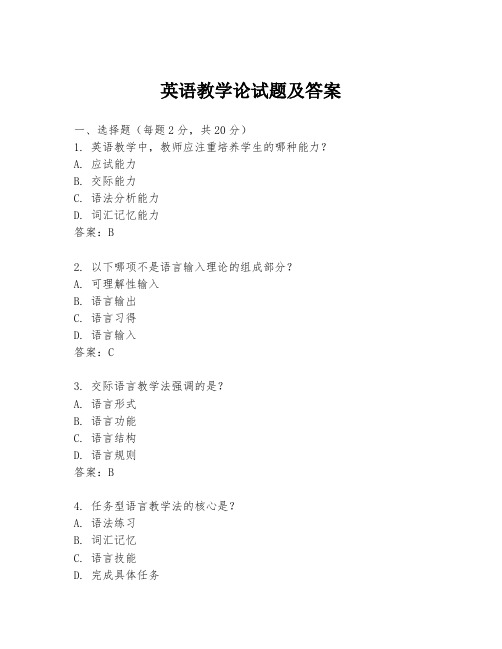
英语教学论试题及答案一、选择题(每题2分,共20分)1. 英语教学中,教师应注重培养学生的哪种能力?A. 应试能力B. 交际能力C. 语法分析能力D. 词汇记忆能力答案:B2. 以下哪项不是语言输入理论的组成部分?A. 可理解性输入B. 语言输出C. 语言习得D. 语言输入答案:C3. 交际语言教学法强调的是?A. 语言形式B. 语言功能C. 语言结构D. 语言规则答案:B4. 任务型语言教学法的核心是?A. 语法练习B. 词汇记忆C. 语言技能D. 完成具体任务答案:D5. 以下哪项不是英语教学中常用的教学方法?A. 直接法B. 翻译法C. 情景法D. 语法翻译法答案:D二、填空题(每题2分,共20分)1. 英语教学中,教师应通过______来激发学生的学习兴趣。
答案:多种教学活动2. 语言输入假说认为,语言习得需要______的输入。
答案:可理解性3. 交际语言教学法认为,语言教学的目的是让学生能够进行______。
答案:有效交际4. 任务型语言教学法强调通过______来学习语言。
答案:完成任务5. 英语教学中,教师应注重培养学生的______能力。
答案:自主学习能力三、简答题(每题10分,共30分)1. 简述任务型语言教学法的主要特点。
答案:任务型语言教学法的主要特点是将语言学习与实际使用结合起来,通过完成具体任务来促进语言知识的学习与应用。
2. 描述一下英语教学中如何有效地进行词汇教学。
答案:有效进行词汇教学的方法包括:使用上下文来教授词汇;通过多种活动让学生在实际语境中使用新词汇;鼓励学生使用词汇进行创造性写作或对话。
3. 论述英语教学中教师角色的变化。
答案:在英语教学中,教师的角色从传统的知识传授者转变为引导者、组织者和促进者,更多地鼓励学生自主学习,参与讨论和合作学习。
四、论述题(每题30分,共30分)1. 结合实际,论述英语教学中如何培养学生的跨文化交际能力。
答案:在英语教学中,培养学生的跨文化交际能力可以通过以下方式实现:首先,教师可以引入不同文化背景的阅读材料,让学生了解不同文化的特点;其次,通过角色扮演、模拟对话等活动,让学生在实际语境中练习跨文化交际;再次,鼓励学生参与国际交流项目,直接与不同文化背景的人交流;最后,教师应培养学生的批判性思维能力,帮助他们理解和尊重文化差异。
英语教育专业《 英语教学论》 课程习题
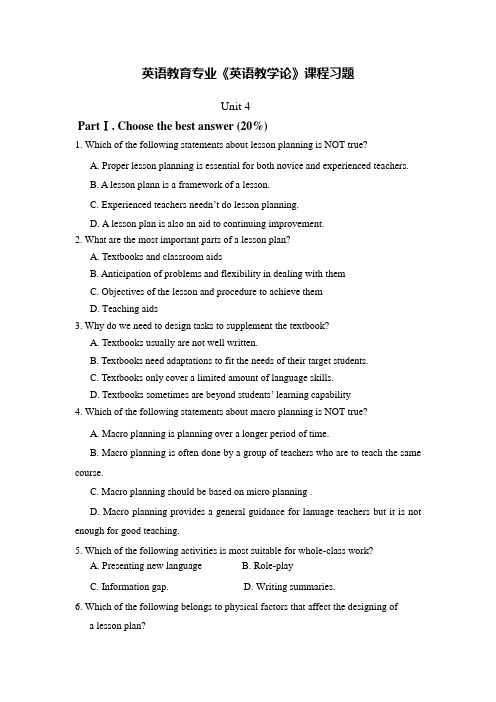
英语教育专业《英语教学论》课程习题Unit 4PartⅠ. Choose the best answer (20%)1. Which of the following statements about lesson planning is NOT true?A. Proper lesson planning is essential for both novice and experienced teachers.B. A lesson plann is a framework of a lesson.C. Experienced teachers needn’t do lesson planning.D. A lesson plan is also an aid to continuing improvement.2. What are the most important parts of a lesson plan?A. Textbooks and classroom aidsB. Anticipation of problems and flexibility in dealing with themC. Objectives of the lesson and procedure to achieve themD. Teaching aids3. Why do we need to design tasks to supplement the textbook?A. Textbooks usually are not well written.B. Textbooks need adaptations to fit the needs of their target students.C. Textbooks only cover a limited amount of language skills.D. Textbooks sometimes are beyond students’ learning capability4. Which of the following statements about macro planning is NOT true?A. Macro planning is planning over a longer period of time.B. Macro planning is often done by a group of teachers who are to teach the same course.C. Macro planning should be based on micro planning .D. Macro planning provides a general guidance for lanuage teachers but it is not enough for good teaching.5. Which of the following activities is most suitable for whole-class work?A. Presenting new languageB. Role-playC. Information gap.D. Writing summaries.6. Which of the following belongs to physical factors that affect the designing ofa lesson plan?A. Students' needs.B. Students' background.C. Student language proficiency.D. Syllabus requirements.7. Macro planning involves the following:A. knowing about the teacher, the students, the book, the activities.B. knowing about the course, the institution, the learners, the syllabus.C. knowing about the aims, the focus, the material, the procedures.D. knowing about the content, the methods, the learners’ learning methods, theprocedures8. Which of the following questions can be used in the questionnaire for assessing participation?A. Did you understand all the questions in today's class?B. Did you finish the task on time?C. Can you use the skills we have learned today?D. What did you do in your group work today?9. Among the following factors that may affect a lesson plan, which one includes classroom size?A. Human factors.B. Physical conditions.C. Syllabus and testing.D. Background informaton10. Which of the following statements about teaching aims is is NOT true?A. One lesson may have a number of aims.B. Aim means the realistic goals for the lesson.C. Teaching aims sometimes are the same as teaching contents .D. Aims are not the things teachers intend to do during the lesson, but the thingsthat students are able to do by the end of the lesson .Part II. Decide whether the following statements are true or false. Write T for true and F for false. ( 20%)1.( ) To learn the use of comparative forms of adjectives belongs to teaching aims .2. ( ) When you do a starter, you should bear in mind it must directly contribute tothe overall lesson objectives.3. ( ) In a sense , macro planning is writing lesson plans for specific lessons.4. ( ) Not all new words in a lesson are equally important .5. ( ). A teacher’s reference book can help planning, but it cannot replace the teacher’s own ideas for what he or she wants to achieve in the class.6. ( ) Teaching stages refer to the major chunks of activities that teachers go through in a lesson.7. ( ) The end of lesson summary is a very important stage for the teacher to take learning further and deeper by helping students to refer back to the learning objectives .8.( ) Flexibility means the contents and tasks planned for the lesson should be within the learning capability of the studens.9. ( ) Good linkage makes the lesson transit from one stage to the next smoothly and students experience less anxienty .10. ( ) Teaching obj ectives shoud focus on the teachers’ performance rather than the learners’Part Ⅲ: Problem Solving (30%)Directions:Below are two situations in the classroom. Each has a problem. First, identify the problem.Second, provide your solution according to the principles of language teaching.1. When preparing a lesson, some teachers just rely on the teacher's book, Before teaching a lesson, they will just look up the new words in the dictionary and copy paraphrases from the teacher' s book onto the student' s book. In class, they will just follow the instructions provided by the teacher's book.2. In a listening lesson, the teacher first plays the recording for students to listen. Then he stops the recording from time to time trying to explain some difficult words and phrases in Chinese.Part Ⅳ:Mini-lesson Plan ( 30 %)The following is an abstract from Senior Ⅱ, Student Book. Please design a teaching plan with the dialogue.Name of activity :Objective(s) of the activity: Classroom organization of the activity : Teacher's role :Students' role :Teacher working timeStudent working timeTeaching aids :Predicated problemsSolutions:Procedures:1)2)3)4)试题答案及评分标准PartⅠ. Choose the best answer (20%)1. C2. C3. B4. C5. A6.C7. B8. D9. B 10. CPart II. Decide whether the following statements are true or false. ( 20%)本题为判断题,共10个小题,20分,每题2分。
华师在线10年秋季英语教学理论100分作业
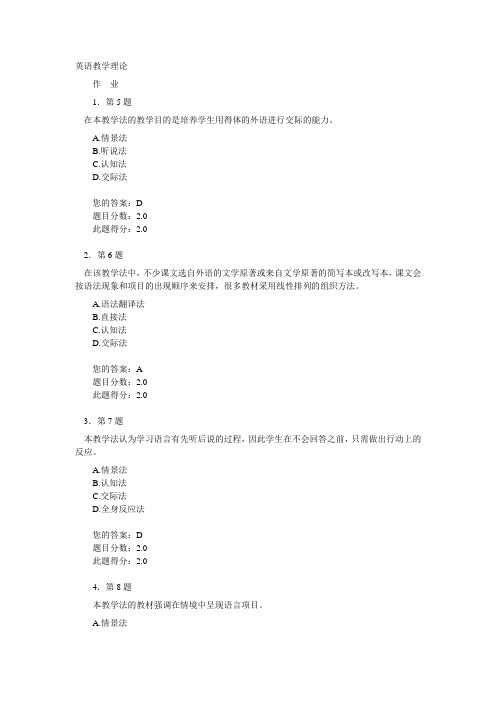
英语教学理论作业1.第5题在本教学法的教学目的是培养学生用得体的外语进行交际的能力。
A.情景法B.听说法C.认知法D.交际法您的答案:D题目分数:2.0此题得分:2.02.第6题在该教学法中,不少课文选自外语的文学原著或来自文学原著的简写本或改写本,课文会按语法现象和项目的出现顺序来安排,很多教材采用线性排列的组织方法。
A.语法翻译法B.直接法C.认知法D.交际法您的答案:A题目分数:2.0此题得分:2.03.第7题本教学法认为学习语言有先听后说的过程,因此学生在不会回答之前,只需做出行动上的反应。
A.情景法B.认知法C.交际法D.全身反应法您的答案:D题目分数:2.0此题得分:2.04.第8题本教学法的教材强调在情境中呈现语言项目。
A.情景法B.认知法C.交际法D.全身反应法您的答案:A题目分数:2.0此题得分:2.05.第9题该教学法的一个特点是教师会尽量使用真实的材料来进行教学,这些材料能取自外文的报刊和杂志,也可以取自外国的电台、电视台或电影。
A.听说法B.认知法C.交际法D.全身反应法您的答案:C题目分数:2.0此题得分:2.06.第10题本教学法的教材很多是以功能—意念大纲为主线来编写的。
A.直接法B.听说法C.认知法D.交际法您的答案:D题目分数:2.0此题得分:2.07.第11题认为学习外语的目的是通过学习外语培养其阅读文学作品的能力。
为达到此目的,学生必须掌握外语的词汇和语法规则。
A.语法翻译法B.直接法C.认知法D.交际法您的答案:A题目分数:2.0此题得分:2.09.第13题本教学法认为教学活动应以学生为中心,学生是外语的积极使用者,在教师的指导下,发现语言规则、理解语言规则并在大量的交际活动中创造性地运用这些规则。
A.情景法B.听说法C.认知法D.交际法您的答案:C题目分数:2.0此题得分:2.010.第14题本教学法的教材强调在情境中呈现语言项目。
A.情景法B.认知法C.交际法D.全身反应法您的答案:A题目分数:2.0此题得分:2.011.第15题该教学法和听说法有共同的理论基础,但是,它也有不同于听说法的特点。
英语学科教学论作业1
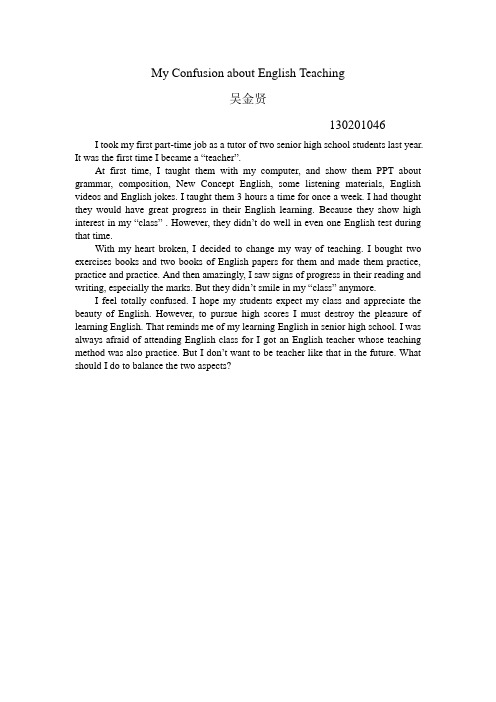
My Confusion about English Teaching吴金贤130201046I took my first part-time job as a tutor of two senior high school students last year. It was the first time I became a “teacher”.At first time, I taught them with my computer, and show them PPT about grammar, composition, New Concept English, some listening materials, English videos and English jokes. I taught them 3 hours a time for once a week. I had thought they would have great progress in their English learning. Because they show high interest in my “class” . However, they didn’t do well in even one English test during that time.With my heart broken, I decided to change my way of teaching. I bought two exercises books and two books of English papers for them and made them practice, practice and practice. And then amazingly, I saw signs of progress in their reading and writing, especially the marks. But they didn’t smile in my “class” anymore.I feel totally confused. I hope my students expect my class and appreciate the beauty of English. However, to pursue high scores I must destroy the pleasure of learning English. That reminds me of my learning English in senior high school. I was always afraid of attending English class for I got an English teacher whose teaching method was also practice. But I don’t want to be teacher like that in the future. What should I do to balance the two aspects?。
英语教学理论作业
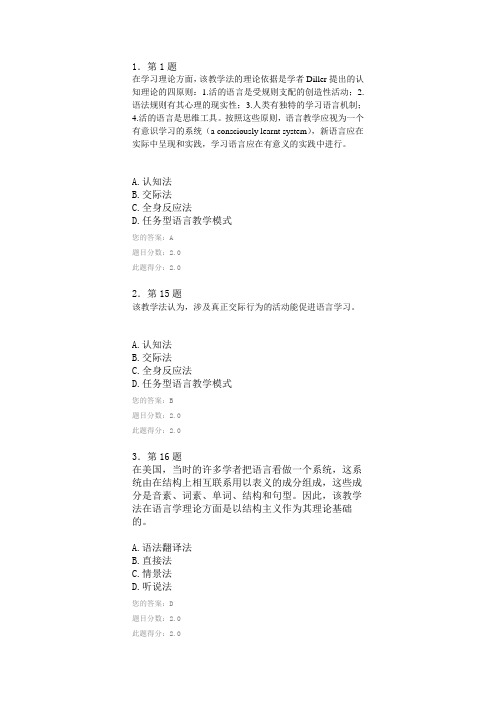
1.第1题在学习理论方面,该教学法的理论依据是学者Diller提出的认知理论的四原则:1.活的语言是受规则支配的创造性活动;2.语法规则有其心理的现实性;3.人类有独特的学习语言机制;4.活的语言是思维工具。
按照这些原则,语言教学应视为一个有意识学习的系统(a consciously learnt system),新语言应在实际中呈现和实践,学习语言应在有意义的实践中进行。
A.认知法B.交际法C.全身反应法D.任务型语言教学模式您的答案:A题目分数:2.0此题得分:2.02.第15题该教学法认为,涉及真正交际行为的活动能促进语言学习。
A.认知法B.交际法C.全身反应法D.任务型语言教学模式您的答案:B题目分数:2.0此题得分:2.03.第16题在美国,当时的许多学者把语言看做一个系统,这系统由在结构上相互联系用以表义的成分组成,这些成分是音素、词素、单词、结构和句型。
因此,该教学法在语言学理论方面是以结构主义作为其理论基础的。
A.语法翻译法B.直接法C.情景法D.听说法您的答案:D题目分数:2.0此题得分:2.04.第17题该教学法认为,依靠语言互动,学生能获取和理解语言输入,使用语言表述、交流。
学生能在意义协商的过程中建构自己的语言系统。
A.认知法B.交际法C.全身反应法D.任务型语言教学模式您的答案:D题目分数:2.0此题得分:2.05.第18题在该教学法中,学生使用目标语完成社会中出现的各类任务。
在学习过程中他们通过语言互动进行交际;在大量的听、说、读和写的活动中使用语言和语言运用策略交流,最终培养起用目标语在社会活动中做事的能力。
因此,可以说,该教学方法强调通过使用目标语互动达到培养交际能力的目的。
A.认知法B.交际法C.全身反应法D.任务型语言教学模式您的答案:D题目分数:2.0此题得分:2.06.第19题在该教学方法中,在学习语言过程中,教师是语言分析的引导者和语言项目操练的组织者。
《英语课程与教学论》作业 (附答案)
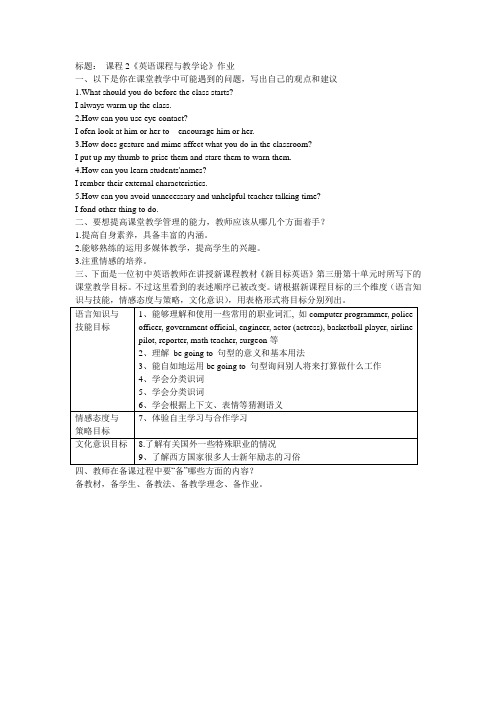
标题:课程2《英语课程与教学论》作业一、以下是你在课堂教学中可能遇到的问题,写出自己的观点和建议1.What should you do before the class starts?I always warm up the class.2.How can you use eye contact?I ofen look at him or her to encourage him or her.3.How does gesture and mime affect what you do in the classroom?I put up my thumb to prise them and stare them to warn them.4.How can you learn students'names?I rember their external characteristics.5.How can you avoid unnecessary and unhelpful teacher talking time?I fond other thing to do.二、要想提高课堂教学管理的能力,教师应该从哪几个方面着手?1.提高自身素养,具备丰富的内涵。
2.能够熟练的运用多媒体教学,提高学生的兴趣。
3.注重情感的培养。
三、下面是一位初中英语教师在讲授新课程教材《新目标英语》第三册第十单元时所写下的课堂教学目标。
不过这里看到的表述顺序已被改变。
请根据新课程目标的三个维度(语言知识与技能,情感态度与策略,文化意识),用表格形式将目标分别列出。
四、教师在备课过程中要“备”哪些方面的内容?备教材,备学生、备教法、备教学理念、备作业。
16秋华师《英语教学论》在线作业

一、判断题(共50道试题,共100分。)
1. The vowel is produced without (or with little) restriction during its production and is always voiced.
A.错误
A.错误
B.正确
正确答案:Leabharlann 30. If the teacher were talking too much in class the students would not be learning.
A.错误
B.正确
正确答案:
31. The relationship between the spoken and written word is identical in English.
A.错误
B.正确
正确答案:
15. When the students listen to recorded materials there is very little opportunity for immediate interaction.
A.错误
B.正确
正确答案:
16. The natural order hypothesis is presumed by Krashen to be the result of the learned system, operating free of conscious grammar.
A.错误
B.正确
正确答案:
28. Usually a lesson should focus on practicing one single skill so that the students can develop that skill successfully.
英语教学论作业
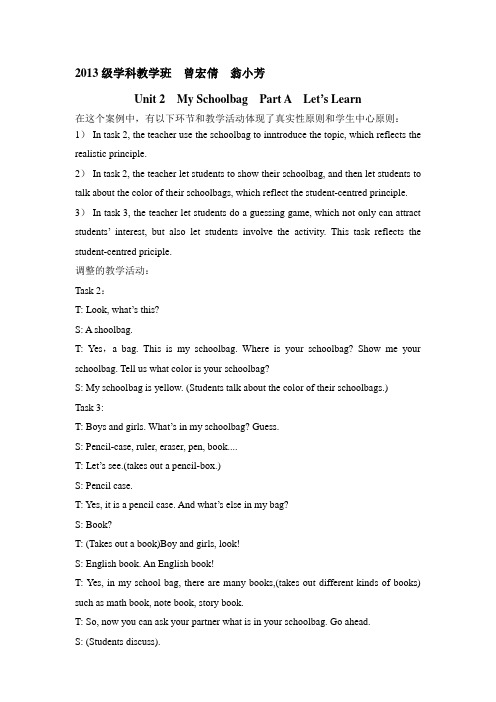
2013级学科教学班曾宏倩翁小芳Unit 2 My Schoolbag Part A Let’s Learn在这个案例中,有以下环节和教学活动体现了真实性原则和学生中心原则:1)In task 2, the teacher use the schoolbag to inntroduce the topic, which reflects the realistic principle.2)In task 2, the teacher let students to show their schoolbag, and then let students to talk about the color of their schoolbags, which reflect the student-centred principle. 3)In task 3, the teacher let students do a guessing game, which not only can attract students’interest, but also let students involve the activity. This task reflects the student-centred priciple.调整的教学活动:Task 2:T: Look, what’s this?S: A shoolbag.T: Yes,a bag. This is my schoolbag. Where is your schoolbag? Show me your schoolbag. Tell us what color is your schoolbag?S: My schoolbag is yellow. (Students talk about the color of their schoolbags.)Task 3:T: Boys and girls. What’s in my schoolbag? Guess.S: Pencil-case, ruler, eraser, pen, book....T: Let’s see.(takes out a pencil-box.)S: Pencil case.T: Yes, it is a pencil case. And what’s else in my bag?S: Book?T: (Takes out a book)Boy and girls, look!S: English book. An English book!T: Yes, in my school bag, there are many books,(takes out different kinds of books) such as math book, note book, story book.T: So, now you can ask your partner what is in your schoolbag. Go ahead.S: (Students discuss).。
_英语教学论_期末教案作业模板
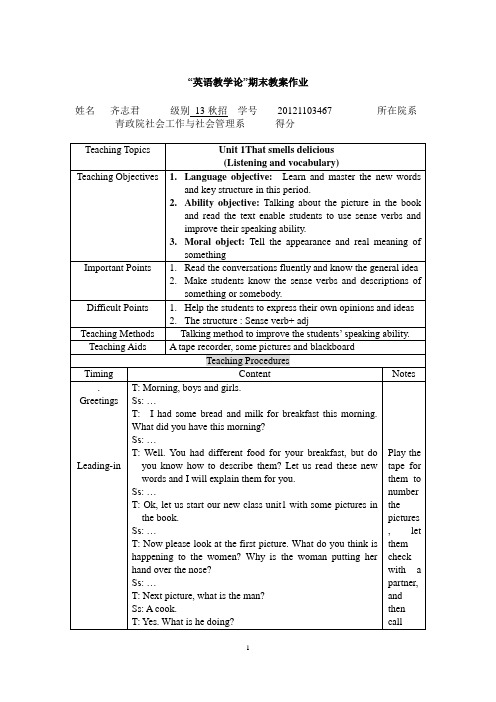
Key structure:sense verbs + adj
Questions:
f.What is Betty doing?
g.What is Lingling doing?
h.How does the onion taste?
2.Ability objective:Talking about the picture in the book and read the text enable students to use sense verbs and improve their speaking ability.
3.Moral object:Tell the appearance and real meaning of something
Ss: …
T: Do the task 7 on page 57,. Then I will ask you to work in pairs and make dialogues, talk about likes and dislikes.
Ss: …
Sample dialogue:
- Do you likeBeijingroast duck?
Ss: …
T: Class is over.
Ss: …
Play the tape for them to number the pictures, let them check with a partner, and then call back the answers from the whole class.
-Yes, it smells sweet and looks beautiful.
小学英语教学理论作业

作业:英语教学目标09404040145 09英本一班邹慧梅教学内容:人教版三年级下册Unit one How are you教学目标:知识技能1,能用How are you问候别人,并能根据对方的回答给出正确地反映; 2,接受别人的How are you问候,并能根据自己的情况给出正确地回答Fine , thank you。
/I am not very well.4,能sing and act 歌曲Hello teacher。
情感目标1,学生根据所学的知识创建对话,进行问答,鼓励学生之间互相关心和帮助。
2, 通过小组“问答接龙“的游戏,培养学生之间的团结合作和竞争意识。
文化理解1, 比较中西方的问候的不同点,中国:“你吃饭了吗?去哪里了?……“,外国:Hi, Hello, How are you? 等等。
语言知识1,能正确地书写字母N/n以及单词noodle, net, banana。
Teaching contend Unit one How are youTeaching objectivesLanguage skills1 Can greet others with the sentence “how are you” and give the correct reply according to their answer;2 Can receive other’s greeting “how are you?”and give the correct answer, such as “fine, thank you.” or “no, I am not very well.” according to their own feelings.3 Can act and sing the song “hello teacher”.Language knowledge1 Can read and write the letter “N/n”, and three word “noodle, net, banana”.Affect1 Encourage students to help and care for each other through creating dialogue based on what we have learned.2, Cultivate team-work and competition awareness among students through game.Culture understanding1 Realize the difference of greeting between China and foreign countries. In china : “你吃饭了吗?去哪里?…。
教学论作业,英语,教案
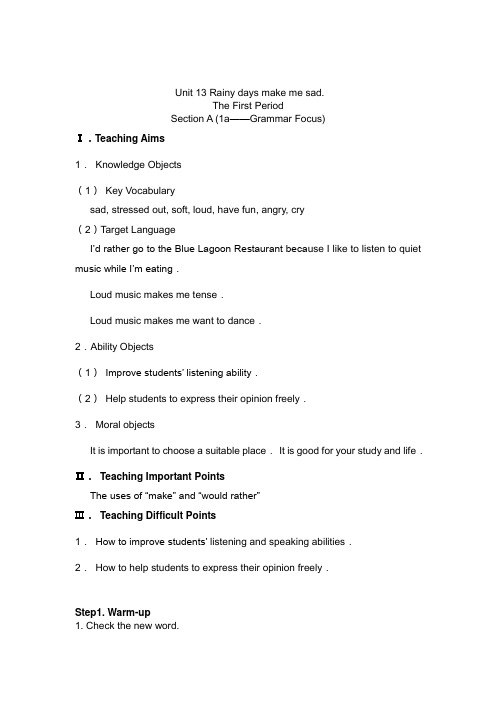
Unit 13 Rainy days make me sad.The First PeriodSection A (1a——Grammar Focus)Ⅰ.Teaching Aims1.Knowledge Objects(1)Key Vocabularysad, stressed out, soft, loud, have fun, angry, cry(2)Target LanguageI’d rather go to the Blue Lagoon Restaurant beca use I like to listen to quiet music while I’m eating.Loud music makes me tense.Loud music makes me want to dance.2.Ability Objects(1)Improve students’ listening ability.(2)Help students to express their opinion freely.3.Moral objectsIt is important to choose a suitable place.It is good for your study and life.Ⅱ.Teaching Important PointsThe uses of “make” and “would rather”Ⅲ.Teaching Difficult Points1.How to improve students’ listening and speaking abilities.2.How to help students to express their opinion freely.Step1. Warm-up1. Check the new word.(1) Check the pronunciation of the new word, lagoon.Get all the students to read the word together. Then have the students read the word by themselves and check in groups. The teacher can give some help about the pronunciation.(2) Show some exercises about the important points from 1a to Grammar Focus.It _________(rain) yesterday. _________(rain) days often make me sad.The ________(awe) pictures make Amy sad.Loud music makes me ____________(happily).___________(wait) for her made me angry.Sad movies make her _________(want) _____________(leave).Check the answers together. Get some students to tell the reasons.2. Free talk.Show two pictures.T: I like Picture 1 becau se it makes me relaxed. But I don’t like Picture 2 because it makes me sad.Have students talk about the pictures like the teacher——I like… because it makes me…, but I don’t like… because it makes me…Step2. Lead-inShow another picture in 1a. One is the Rockin’ Restaurant, the other is the Blue Lagoon Restaurant.1. Get the students to look at the picture and describe it.For example,The pictures in the Rockin’ Restaurant are awful and the music is loud.The plants in the Blue Lagoon Restaurant are beautiful and the music is soft.(At the same time, teacher write them on the blackboard.)Then help students make conclusions:The awful pictures make me…The loud music makes me…The beautiful plants make me…The soft music mekes me…(At the same time, teacher write them on the blackboard.)T: Which restaurant would you rather go to?Ss: I would rather go to the …. (At the same time, teacher write them on the blackboard.)2. Practice the sentences on the blackboard.Step3. 1bT: What do Amy and Tina think of the two restaurants? Listen to the recording and fill in the blanks.Students listen to the recording for the first time to fill in the blanks.Then check the answers in pairs.Listen to the recording again and then check the answers together.Get students read the four sentences by themselves.Step4. 1cDo pairwork. Look at Amy’s and tina’s opinions in the chart. What is your opinion?Get students make new conversations in pairs and show them to the whole class.Step5. 2aListening and numberingA boy and a girl are talking about their past experiences. Listen to their talk and number the pictures on page 103.Listen to the recording and number the pictures.Then check the answers together.Step6. 2bListening and checkingListen to the conversation once again. Before listening, go over the seven sentences said by Tina and John in the box on page 103. C heck √the things said by them respectively. Then check the answers each other.T: All right now, you are supposed to read the tape script. While reading, try to circle the “make/s me + infinitive, make/s me + adjective structure”, underline the expressions and blacken the connectives.Step7. 2c1. Do pairworkGo over the activities in 2a and 2b. Then in pairs try to role play the conversation between Tina and John. You may make use of the examples on page 103 to begin with.Teacher can give students some help:John: Did you have fun with Amy last night?Tina: Well… yes and no. she was really late. Waiting for her made me angry. And we went to the Rockin’ Restaurant….Get some pairs to show their conversations.2. Have students write their conversations down on their notebooks.Step8.Grammar Focus1. Let students write down all the sentences with “make” and get them to find out the use of “make”.make sb.+ adjectivemake sb.+ infinitive2. Show some sentences about “would rather”, help stu dents find out the use of “would rather”.would rather + doStep9. Exercises( )1. Usually soft music may make people ________.A. relaxingB. relaxedC. excitingD. excited( )2. The movie made _______ fell energetic.A. heB. hisC. theyD. them( )3. Loud music always makes us ________.A. want danceB. to want danceC. want to danceD. to want to dance( )4. _______his new sunglasses ________ him look mysterious.A. Wears, makeB. Wears, makesC. Wearing, makeD. Wearing, makes( )5. I’d rather _______ in the countryside because in the cities there is much pollution.A. livingB. livedC. to liveD. live( )6. I like to listen to quiet music while _______.A. eatingB. to eatC. eatD. eatedThen check the answers one by one.Step10. HomeworkMake up sentences using “make”.Give students some examples:Long movies make me .Hot weather makes me .。
- 1、下载文档前请自行甄别文档内容的完整性,平台不提供额外的编辑、内容补充、找答案等附加服务。
- 2、"仅部分预览"的文档,不可在线预览部分如存在完整性等问题,可反馈申请退款(可完整预览的文档不适用该条件!)。
- 3、如文档侵犯您的权益,请联系客服反馈,我们会尽快为您处理(人工客服工作时间:9:00-18:30)。
农村初中生学习英语兴趣调查问卷分析报告一、调查的背景随着社会生活的信息化、经济活动的全球化、文化习俗的多元化,农村初中英语教学,成为当今基础教育的一大热点,也是家长和学校关注的焦点,在追求高质量的英语课堂教学时,也应该注重培养学生学习英语的兴趣。
《英语课程标准》明确提出:在义务教育阶段,英语课程的目标是激发和培养学生的学习兴趣,帮助学生树立信心,养成良好的学习习惯,发展自主学习的能力,形成有效的学习策略......所以,在新课程理念下,激发和培养农村初中学生学习英语的兴趣是我国基础教育的一个重要课题。
为此,我组于2014年2月份设计问卷,并进行了“农村初中学生学习英语兴趣”的问卷调查。
二、调查的目的此次问卷调查,目的在于准确地把握当前农村初中学生学习英语兴趣的现状,加强针对性研究,有效推动《关于农村初中学生学习英语的兴趣培养研究》课题的深入开展,为接下来的研究提供客观依据,以期探索培养农村初中学生学习英语兴趣的方法与途径,形成模式,从而提高农村初中学校英语教学的效率。
二、调查的对象及内容对象:七年级四个课题实验班学生,七年级(54)、(55)、(56)、(57)班学生。
内容:主要从英语教师、学生、英语语言学习环境等多维设置方面,内容涵盖了学生学习英语的兴趣及原因;学生学习英语的目的;学生学习英语时对教师的看法;学生学习英语中的困难;英语教学内容、教学方法、教学手段、教学评价以及课外学习资源等多方面,设置了主、客观两种问题。
(详见《农村初中学生学习英语兴趣调查问卷》)三、调查方法(1)问卷调查学生问卷从英语教师、学生、英语语言学习环境等多维设置,内容涵盖了体现兴趣的教学内容、教学方法、教学手段、教学评价以及课外学习资源等多方面,设置了主、客观两种问题(2)座谈会与个案访谈在调查阶段,我们召开了教师座谈会以及学生个案访谈。
这些座谈会与访谈为我们提供了大量的生动典型材料,而且为理性分析提供了基础。
四、调查数据分析通过本次问卷调查以及座谈会与个案访谈,得知有37.3%的学生对英语感兴趣,有31.5%的学生不感兴趣,回答一般的占31.2%,值得注意的是:随着年级的递增,学生对英语学习的兴趣逐年级递减;而且男生比女生更容易失去兴趣。
大部分学生学英语的动力来自升学、社会就业或家长老师压力,只有27.4%的学生出于个人爱好学习英语。
学生把影响学习英语兴趣的主要原因归咎于教师、课程内容或设备环境等方面,必须指出的是:慈祥、幽默、一视同仁、有扎实英语专业知识的老师是学生心目中的好老师,学生的向师性比较明显。
学生学习英语的主要困难低年级学生集中在词汇的记忆上(占53.9%),而高年级学生集中于写作上(占66.1%)。
对于每天课余花在英语学习上的时间,50.4%的学生选择30—60分钟,然而,奇怪的是做到课前预习,课后及时复习的只占28.9%,大部分学生忙于完成英语作业或试卷。
学生普遍希望教师用汉语组织教学,高达71.1%。
90.3%的学生渴望轻松活跃的英语课,绝大部分学生相信教师使用多媒体教学,开展课外英语活动会提高学生学习英语的兴趣,但是,主动寻求课外学习资源的仅占9.8%。
关于学习英语过程中遇到的问题,大多数学生选择积累或忽视不理,出错时希望老师帮助指出错误的占52.1%,主动说英语的更是微乎其微。
通过个案访谈,我们发现绝大部分学生最希望得到老师或同学的肯定评价。
五、调查的结果综合调查结果分析,主要存在以下方面问题:1、学生方面学生学习英语的问题可以归纳为“四缺”:缺目的、缺兴趣、缺信心、缺方法。
农村地区,人们思想观念不积极,读书无用不如出去打工,在这些观念的影响下,部分学生学习无目的,更不知学英语干何用。
部分学生是迫于家长或老师的压力而学习,惰性十足,学习兴趣低下。
尤其是英语这种语言学科。
这是“缺目的”。
七年级学生刚接触英语时有新鲜感,对英语兴趣较浓,但随着学习难度加大,词汇过多、课文过长,学生渐渐跟不上老师的节奏,慢慢失去学习英语的兴趣,到最后干脆放弃学习。
这是“缺兴趣”。
由于小学英语教学的不均衡,学生英语基础参差不齐,有些学生会对英语学习失去信心乃至丧失兴趣,从而产生放弃的念头;加之现在许多独生子女,他们自小在溺爱的蜜瓶中长大,心理脆弱,受不了挫折,学习遇到问题,自暴自弃,懒于思考,懒于练习,从而导致恶性循环。
这是“缺信心”。
农村初中绝大部分学生采用死记硬背的学习方式来学英语。
他们背单词、背课文、背语法、甚至背题目。
除此之外,就是做大量英语题,通过做题学英语。
这样,违背了语言学习的特点,失去了语言的交际性。
这是“缺方法”。
2、英语教师方面由于现在学生还是要通过考试入学,在中考的指挥棒下,农村初中英语教师英语教学重教材、重讲解、重传统、重优生。
农村学校受社会经济条件限制,缺少现代教学资源。
“一本教材,两支粉笔,三尺讲台,四十分钟”就是我们的真实写照。
从备课到上课,日复一日,年复一年,不管教材内容符不符合学生学习实际,教科书上出现的单词短语、句型结构、语法现象,再枯燥再乏味,也得灌。
这就是“重教材”。
教学过程中,以教师为中心,教学目标的制定、教学过程的推进都以教师为“主体”。
平时都是老师讲,学生听、记、背,把学生当做被动接受知识的容器,压制了学生好思、好动的天性,渐渐打击了他们积极参与课堂的积极性,学习英语兴趣也慢慢消失。
此所谓“重讲解”。
虽然现在农村初中都配有一些多媒体教学设备,但这些仅限于教师上公开课、观摩课时使用,平时利用率不高,大部分教师基本上只运用最传统的教学手段,没有给学生直接的体验,不能更好地激发学生学习英语的兴趣。
此所谓“重传统”。
目前学生学英语只是为了考试,教师教也只是为了应试,教师教的仅限于考试考的,为了尽快出成绩,出好成绩,教师一般喜欢把注意力集中在班上英语成绩好的。
课堂教学中,包括平时的辅导中,也只注重这些优生。
许多英语基础差的学生,缺少学习与训练的机会,得不到应有的合理评价,特别是来自老师的鼓励性评价,所以他们体会不到英语学习的乐趣,逐渐失去兴趣,以至于最后放弃英语学习。
此所谓“重优生”。
3、学习英语的环境方面当前,农村学生家庭整体素质不高,对孩子的教育管理缺少有效的方法指导,对孩子的个性发展缺少有效关注,对孩子的健康成长缺少关注,对孩子的英语学习更是无能为力。
而农村初中学校英语课又是在专业师资力量不足、教学条件不充分、教学实验较少、经验更为缺乏的情况下开设的,存在许多问题,尤其是学生学习英语兴趣的培养问题最为突出。
同时,学生缺少获取课外英语学习资源的途径,缺少学习、使用英语语言的环境。
六、建议综合上述实际调查和具体分析,我认为初中生学习英语的兴趣与其各方面的条件因素有直接联系,教师在不断完善自己业务水平的同时,还应强化素质教育,通过各种手段来激发学生的兴趣和潜在智慧,使师生的水平都能得到很大的提高。
随着社会的发展和素质教育的深入,今天的英语教学已经不再像往日一样,只是为了应付一张试卷的"哑巴英语"。
培养和激发学生学习兴趣,让他们敢说英语、能说英语、会说英语,打下良好的语音、语调和语感基础,这才是我们英语教师的责任所在。
现实的教学实践使我深深明白:英语教师不仅要能说一口流利的英语,还要能运用例如背顺口溜、讲故事、唱歌、跳舞、画画、比赛、游戏、情景表演等多种多样,生动有趣的教学手段,这样才能真正做到把教学内容与学生的兴趣点结合起来,学生才能因为教学内容的吸引而兴奋起来。
只有这样,我们的英语教学才能更具科学性,才能更加符合语言学和初中生心理发展的规律,在全面提高学生素质的同时,让他们的个性得到最大限度的发展,从而为社会培养出更多、更广、更优的接班人。
初中学生英语学习兴趣调查问卷一、性别:()男()女二、年级:()七年级()八年级()九年级三、英语成绩:()很好()一般()差1、你喜欢学英语吗?为什么?()非常喜欢()喜欢()一般()不喜欢原因:2、你学习英语的主要动力是什么?()个人兴趣爱好()考学需要()社会就业需要()家长老师意志3、你认为影响你英语学习兴趣的主要原因是什么?()个人原因()教师原因()课程内容本身()设备环境4、你认为现在初中英语教学主要存在什么问题?()教师水平有限()学生自身问题(比如基础差,兴趣低等)()教学模式呆板()教学与实践脱离5、你认为哪些措施可以有效激发学生的学习英语兴趣?()使用多媒体等教学手段()开展英语课外活动()教师多鼓励帮助()强调英语学习的重要性6、你喜欢老师用什么方式上课?()主要用英语()主要用汉语()中英结合7、你认为初中英语教学中什么环节最重要?()单词和句型运用()语法()听说能力()阅读和写作能力8、在学英语中,你遇到的主要困难是什么?()听力()口语()语法()阅读()写作9、你经常以什么样的学习方式学习?()课前预习()课堂认真听讲()课后认真复习()自学10、你会主动寻找机会学习英语吗(如:收听、收看英语节目,自觉做英语课外习题等)?()经常()有时候()很少()从不11、对学英语中出现的错误,你会怎样对待?()积累起来,经常复习()创造环境,有意识运用()忽视不理12、学习中遇到困难,你会怎样?()主动请教老师()请教同学()自己查有关资料和参考书()不请教任何人,不会就不会13、日常生活中你是否积极主动说英语?()不好意思,不说()大胆地说,不顾忌()别人说才说14、你认为在英语学习过程中,你有什么好的学习方法或经验注:1、请各位同学在以上自己选择的()内打“√”。
2、本次调查采用无记名投票,不需写姓名。
